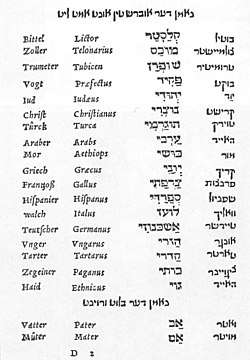Goy
In modern Hebrew and Yiddish goy (/ɡɔɪ/, Hebrew: גוי, regular plural goyim /ˈɡɔɪ.ɪm/, גוים or גויים) is the standard term for a gentile.[1][2][3]
| Part of a series on |
| Judaism |
|---|
   |
|
|
|
|
|
Other religions |
|
Related topics |
|

In biblical Hebrew goy is the standard term for a nation.[4] The word nation has been the common translation of the Hebrew goy or Greek ethnos in the Septuagint, from the earliest English language bibles such as the 1611 King James Version[5] and the 1530 Tyndale Bible,[6] following the Latin Vulgate which used both gentile (and cognates) and nationes. The term nation did not have the same political connotations it entails today.[7][8] The word "gentile" is a synonym for the Hebrew word nokri or nokhri (Hebrew: נָכְרִי) which signifies "stranger" or "non-Jew".[9]
Long before Roman times it had also acquired the meaning of someone who is not Jewish.[10] It is also used to refer to individuals from non-Jewish religious or ethnic groups. The term goy is not inherently any more or less offensive than the term gentile,[1][2][3] unlike the term Sheigetz.
As the Jews considered all of the non-Jewish nations in biblical times as polytheistic and idolatrous, goy acquired the meaning "heathen". In a more comprehensive definition, the word goy corresponds to the term ummot ha-olam (nations of the world).[9]
Hebrew Bible
The word goy means "nation" in Biblical Hebrew. In the Torah, goy and its variants appear over 550 times in reference to Israelites and to gentile nations. The first recorded usage of goyim occurs in Genesis 10:5 and applies innocuously to non-Israelite nations. The first mention of goy in relation to the Israelites comes in Genesis 12:2, when God promises Abraham that his descendants will form a goy gadol ("great nation"). In Exodus 19:6, the Israelites are referred to as a goy kadosh, a "holy nation".[11] While the books of the Hebrew Bible often use goy to describe the Israelites, the later Jewish writings tend to apply the term to other nations.
Some Bible translations leave the word goyim untranslated and treat it as the proper name of a country in Genesis 14:1, where it states that the "King of Goyim" was Tidal. Bible commentaries suggest that the term may refer to Gutium. In all other cases in the Bible, goyim is the plural of goy and means "nations".[4]
One of the more poetic descriptions of the chosen people in the Hebrew Bible, and popular among Jewish scholarship, as the highest description of themselves: when God proclaims in the holy writ, goy ehad b'aretz, or "a unique nation upon the earth!" (2 Samuel 7:23 and 1 Chronicles 17:21).
Because of the idolatry and immoralities of the surrounding nations, the biblical writings show a passionate intolerance of these nations. Thus the seven goyim, i.e., nations (Deuteronomy 7:1, 12:2), were to be treated with but little mercy; and, more especially, marriages with them were not to be tolerated (Deut. 7:3; comp. Exodus 34:16).[12]
Nonetheless, the focus of the 70 sacrifices brought on the Succot holiday was for good and welfare of the seventy nations of the world.[13]
Rabbinic Judaism
The rabbinic literature conceives of the nations (goyim) of the world as numbering seventy, each with a distinct language and purpose.
Chaim ibn Attar[14] maintains that this is the symbolism behind the Menorah:
The seven candles of the Menorah [in the Holy Temple] correspond to the world's nations, which number seventy. Each [candle] alludes to ten [nations]. This alludes to the fact that they all shine opposite the western [candle], which corresponds to the Jewish people.
Maimonides defines plain goy in his Mishneh Torah as a worshipper of idolatry, as he explains, "Whenever we say plainly 'goy', we mean a worshipper of idolatry".[15]
Modern usage
In modern Hebrew and Yiddish the word goy is the standard term for a gentile.[1][2][3]
The term shabbos goy (literally "Sabbath gentile") refers to a non-Jew who performs duties that Jewish law forbids a Jew from performing on the Sabbath.
Gender-specific
While the term goy can,[16] depending on tone of voice and other context clues, be neutral in intent,[17][18] the terms sheigetz and even more so shiksa are not.
Sheigetz
Sheigetz (שייגעץ or in Hebrew שֵׁיְגֶּץ)[19][20] (plural שקצים shkotzim, shgatzim) is a Yiddish word that has entered the English language and refers to a non-Jewish boy or young man. It is used disparagingly.[21]
The word sheigetz, like its feminine counterpart shiksa, according to the Oxford English Dictionary, is derived from sheqeṣ ("a detested thing").[22]
In former times, it was common practice for Ashkenazi Jews who were harassed by youths to label their tormentors shkotzim. Nacham Grossbard of Haifa, writing in the Memorial Book for the Community of Ciechanów (1962), recounted these memories of his early years in Poland: "At the finish of the match, as soon as the whistle blows, we Jewish boys run as fast as we can, out of breath, all the way home in order not to have stones thrown at us or be hit by the shkotzim (non-Jewish boys)."[23]
Shiksa
The term shiksa is the feminine form of sheigetz[24][20] and, like the latter, is based on the biblical word sheketz.[25][26] Shiksa (Yiddish: שיקסע, romanized: shikse) is an often disparaging[27] term for a non-Jewish woman or girl. The word, which is of Yiddish origin, has moved into English usage (as well as Polish and German), mostly in North American Jewish culture. According to the Oxford English Dictionary, it came into English usage in the late 19th century from the Yiddish shikse, which is an adaptation of the Hebrew word šiqṣâ, which is derived from sheqeṣ ("a detested thing") and the feminine suffix -â.[28]
Among Orthodox Jews, the term may be used to describe a Jewish girl or woman who fails to follow Orthodox religious precepts.[27] The equivalent term for a non-Jewish male, used less frequently, is sheigetz.[29]
The etymology of the word shiksa is partly derived from the Hebrew term שקץ shekets, meaning "abomination", "impure," or "object of loathing", depending on the translator.[29] Several dictionaries define shiksa as a disparaging and offensive term applied to a non-Jewish girl or woman.[30][31] In 2014, Rabbi Jack Abramowitz described it as "simply indefensible", "inherently condescending, racist and misogynistic".[32]
In Polish, siksa or sziksa (pronounced [ɕiksa]) is a pejorative but humorous word for an immature young girl or teenage girl. According to Polish language dictionary from 1915, it has been defined as "pisspants"; a conflation between the Yiddish term and its similarity to the Polish verb sikać ("to piss"). In today's language however, it is roughly equivalent to the English terms "snot-nosed brat", "little squirt", and "naughty school-girl" in a humorous context.[33][34]
Shiksa as self-reference
Writer Menachem Kaiser argues in his essay "Anti-non-Semitism: An Investigation of the Shiksa" that "the pejorative connotation of 'shiksa' is fuzzy at best" because "'shiksa' today is used as often as not in winking self-reference".[30]
Goyita
There is a term goyita but it generally is applied to a somewhat older woman, stereotypically a caretaker/cleaning assistant.[35]
References
- Random House Unabridged Dictionary, Second Edition
- Rich, Tracy R. "Jewish Attitudes Toward Non-Jews". Judaism 101. Retrieved January 13, 2012.
There is nothing inherently insulting about the word "goy." In fact, the Torah occasionally refers to the Jewish people using the term "goy." Most notably, in Exodus 19:6, G-d says that the Children of Israel will be "a kingdom of priests and a holy nation," that is, a goy kadosh. Because Jews have had so many bad experiences with anti-Semitic non-Jews over the centuries, the term "goy" has taken on some negative connotations, but in general the term is no more insulting than the word "gentile."
- Wolfthal, Diane (2004). "III - Representing Jewish Ritual and Identity" (Google Books). Picturing Yiddish: gender, identity, and memory in the illustrated Yiddish books of Renaissance Italy. Brill Publishers. p. 59 footnote 60. ISBN 978-90-04-13905-3. Retrieved January 13, 2012.
The word goy means literally "nation," but has come to mean "Gentile," sometimes with a derogatory connotation.
- James Orr, ed. (1939) [1915]. "Goiim". International Standard Bible Encyclopedia. 2. Grand Rapids: William B. Eerdmans Publishing Company. OCLC 819295. Retrieved January 13, 2012.
- KJV Gen 10
- Tyndale Gen 10
- Wiseman, D. J. "Genesis 10: Some Archaeological Considerations." Journal of the Transactions of the Victoria Institute (1955).
- Guido Zernatto & Alfonso G. Mistretta (July 1944). "Nation: The History of a Word". The Review of Politics. 6 (3): 351–366. doi:10.1017/s0034670500021331. JSTOR 1404386.
- "Gentile". Jewish Encyclopedia.
- The Cambridge history of Judaism, Volume 2, Cambridge University Press, 1989, p. 193. ISBN 978-0-521-24377-3
- Or N. Rose; Margie Klein; Jo Ellen Green Kaiser; David Ellenson (2009). Righteous Indignation: A Jewish Call for Justice. Jewish Lights Publishing. p. 4. ISBN 978-1-58023-414-6. Retrieved 18 November 2010.
- "Gentile." Jewish Encyclopedia.]
- Numbers, 29:13-34
- On Numbers 8:2
- Hilchot Ma'achalot Assurot 11:8
- here, not: Daniel Kaplan (2011). The Hate That Never Dies. p. 101.
could hear the little girl ask clearly, "Vos vilt der goy du?"
- "Goy". YiddishDialectDictionary.com.
- An Israeli Prime Minister, while visiting the USA, asked an advisor "Vus Vilt Der Goy" (Jewish Week article by the advisor, post retirement)
- which at times is transliterated as shaygetz, shaigetz, and sheygets
- Vincent Canby (November 30, 1997). "Sunday view: Mamet's Stunning Foray Into The Past". The New York Times.
- "the definition of shegetz". Dictionary.com.
- "Shiksa". Oxford English Dictionary. Second Edition on CD-ROM (v. 4.0). Oxford University Press. 2009. ISBN 978-0-19-956383-8.
- "Ciechanow, Poland (Pages 197-203)". www.jewishgen.org.
- "Schott's Vocab".
- Deut. 27:21
- Pesachim, 49b
- "Shiksa | Definition of shiksa by Merriam-Webster". Merriam-webster.com. Retrieved May 22, 2016.
- "Shiksa". Oxford English Dictionary. Second Edition on CD-ROM (v. 4.0). Oxford University Press. 2009. ISBN 978-0-19-956383-8.
- "soc.culture.jewish FAQ: Miscellaneous and References (11/12) Section - Question 19.6: What does "shiksa" and "shaygetz" mean? How offensive are they?". Faqs.org. March 27, 2014. Retrieved May 22, 2016.
- Kaiser, Menachem (March 6, 2013). "Anti-non-Semitism: An Investigation of the Shiksa". Los Angeles Review of Books. Retrieved May 22, 2016.
- "definition of shiksa". The Free Dictionary. Retrieved May 22, 2016.
- Jack Abramowitz (December 18, 2014). "The Jewish N Word". ou.org. Retrieved May 9, 2018.
- "Warsaw University Digital Library - Słownik języka polskiego". Ebuw.uw.edu.pl. 1915. p. 128. Retrieved May 22, 2016.
- Siksa - Poradnia językowa PWN. Polish Scientific Publishers PWN 2016.
- "Yiddish literature and language".
External links
